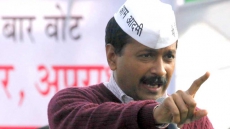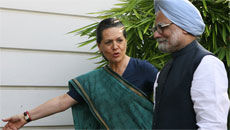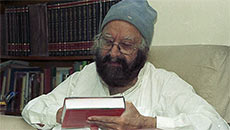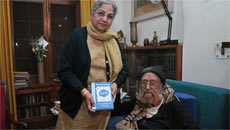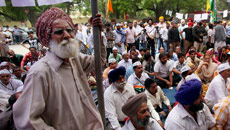In 1992, the Indian Army chief, General Sunith Francis Rodrigues, had to apologise to parliament for suggesting that the armed forces had a stake in India's governance.
One doesn't recall the exact words, but his reasoning went thus: "We are first and foremost citizens of India, we pay our taxes, we are willing to lay down our lives for the country; so why should we be at the bidding of politicians without stating our point of view?"
All hell broke lose, with George Fernandes, who went on to become the defence minister, demanding that Gen. Rodrigues be sacked. Despite tremendous public support, the general backed down and issued an apology that was read out in parliament. It took a while before he was rehabilitated, first on the National Security Advisory Board and then as Punjab governor.
This was not the first time a four-star officer had spoken out his mind.
Way back in the early 1950s, General K.M. Cariappa, as army chief, had wanted to send additional troops to Jammu and Kashmir but was forestalled by prime minister Jawaharlal Nehru. Gen. Cariappa took the unprecedented step of appealing to president Rajendra Prasad, the supreme commander of the armed forces, and Nehru had to backtrack. After his retirement, Gen. Cariappa frequently declaimed on the need for effective governance. He was promptly shunted off to Australia as the Indian high commissioner as the government feared he could engineer a coup!
In the mid-1980s, Lieutenant General S.K. Sinha, then the senior-most officer after the army chief, General K.V. Krishna Rao, and who was expected to move into the top job, was passed over in favour of Lieutenant General A.S. Vaidya, then the General Officer Commanding-in-Chief, Eastern Army Command.
His "crime"? Repeatedly opposing the deployment of the army on internal security duties, the reason being: "If I have to ask my troops to fire on their fellow citizens (to quell riots and other disturbances), how do I expect them to lay down their lives for the country in the case of a war?"
But there was another aspect to this. Most unlike a serving armed forces officer, Lt. Gen. Vaidya had openly supported then prime minister Indira Gandhi's decision to enter into an alliance with a tribal outfit in Tripura that had strong militant links.
But then, things haven't always been negative and a shining example of this is the perfect understanding that existed between Indira Gandhi and the then army chief, General (later Field Marshal) Sam Manekshaw, on the conduct of the 1971 war that led to the creation of Bangladesh out of East Pakistan.
Ever the no-nonsense officer Gen. Manekshaw made it amply clear that he would not be bulldozed and demanded some nine months to be fully ready. Indira Gandhi had no option but to acquiesce and thus, while Bangladesh declared its independence on March 26, 1971, the war began only on December 3 of that year. The result was a clinical victory on the eastern and western fronts.
The question is: Had such a situation existed in the early 1960s, would the 1962 India-China war, whose reverberations are still being felt half a century later, happened?
The top secret Henderson-Brooks report posted online by Australian journalist Neville Maxwell on his blog earlier this week - its contents were hardly a secret as it formed the basis of his seminal work "India's China War" - makes it amply clear that there was a yawning mismatch between the government's thinking and that of the armed forces.
"It is obvious that politically, the Forward Policy (of Jawaharlal Nehru) was desirable and presumably the eviction of the Chinese from Ladakh must be the eventual aim. For this, there can be no argument, but what is pertinent is whether we were militarily in a position at that time to implement that policy," the report says.
That's not all.

"The government, who politically must have been keen to recover territory, advocated a cautious policy whilst Army HQ dictated a policy that was clearly militarily unsound," the report adds for good measure.
Would this mismatch had been there if there were a better interface between the government and the military? Most certainly not!
In fact, there are reports that a war game conducted in 1960 had pointed to a possible Chinese invasion. However, when the three-star officer who conducted the war game moved to become Indian Army chief, the report was quietly shelved, apparently at the government's instance.
Why then has such contraditory situations existed for so long? Because of the traditional bureaucracy-driven trust-deficit that exists with the armed forces - exemplified most recently when Gen. V.K. Singh was army chief and moved a large body of troops in January 2012, rattling the top echelons of the government.
It is this trust-deficit that has prevented the implementation of one of the most crucial defence reforms since Independence: the creation of a Chief of Defence Staff (CDS) as a one-point reference for the government on all matters military. The bureaucracy fears that the CDS could become so powerful that he could come to overshadow them.
The 21st century is far removed from the situation that existed during the First Gulf War (1991), an event that many believe has shaped modern-day strategic thinking as exemplified by the events that followed: the Second Gulf War and the US-led NATO operations in Afghanistan.
While the armed forces have kept up with contemporary developments, the government, unfortunately, remains tied to the past. It's time to shed the sloth and come together for the common good if India is to take its rightful place on the global stage.

